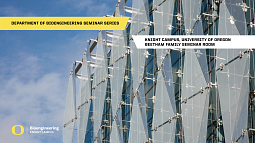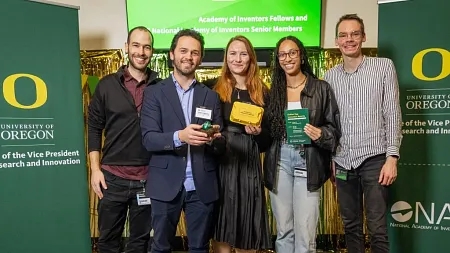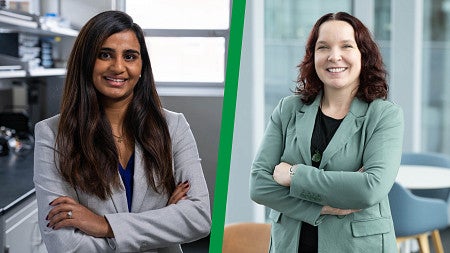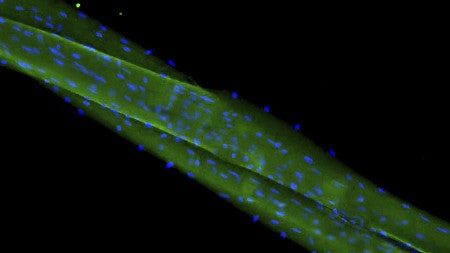1:00–2:00 p.m.
This seminar will feature two PhD candidates from the Knight Campus sharing their research in biomaterials and cancer biology:
-
Phillip Hernandez (Benoit/Guldberg Labs) will present “Engineering Polymeric Nanoparticles for Efficient siRNA Delivery to Human Chondroprogenitor Cells as a Therapeutic Strategy for Osteoarthritis,” focusing on targeted delivery approaches to support cartilage regeneration.
-
Maya Kasteleiner (Dalton/Lindberg Labs) will present “Topographical Guidance of Glioblastoma Migration on Aligned Microfiber Scaffolds,” highlighting the role of scaffold architecture in influencing tumor cell behavior.
Part of the 2025–26 Bioengineering Seminar Series. All are welcome to attend.
2:00–3:00 p.m.
The Knight Campus Department of Bioengineering and the Dalton Lab are pleased to announce that Patrick Hall will defend his bioengineering PhD thesis on Friday, March 6 from 2:00 – 3:00 pm in the Knight Campus Beetham Family Seminar Room. Patrick's presentation is titled: “Advanced Materials and Process Workflows for Melt Electrowriting and Tomographic Volumetric Additive Manufacturing.”
1:00–2:00 p.m.
The Department of Bioengineering is pleased to host Dr. Farshid Guilak, Mildred B. Simon Professor of Orthopaedic Surgery at Washington University, Director of Research for the St. Louis Shriners Hospitals for Children, and co-director of the Washington University Center of Regenerative Medicine.
Please join us Monday, March 16th from 1:00 - 2:00 pm in the Knight Campus Beetham Seminar Room, followed by a brief networking reception. Dr. Guilak's talk is titled “Reprogramming stem cells with synthetic gene circuits: It’s about time!”
Dr. Farshid Guilak is the Mildred B. Simon Professor of Orthopaedic Surgery at Washington University, Director of Research for the St. Louis Shriners Hospitals for Children, and co-director of the Washington University Center of Regenerative Medicine. His laboratory focuses on multidisciplinary approaches that combine biology and bioengineering to study arthritis, with the goal of developing new stem cell therapies or pharmacologic treatments for arthritis. He has published over 440 articles in peer-reviewed journals and has co-edited four books. He has won numerous national and international awards, including 7 honors for excellence in mentoring, most recently the renaming of the Orthopaedic Research Society’s mentoring award to the “Farshid GuilakExcellence in Mentoring Award”. He was elected to the National Academy of Engineering, the National Academy of Medicine, and the National Academy of Inventors for advances in the fields of regenerative medicine and mechanobiology, including the applications of synthetic biology to these fields. He is also the founder of several biotechnology startup companies.
Reprogramming stem cells with synthetic gene circuits: It’s about time!Arthritis represents a painful and debilitating family of joint diseases that is characterized by progressive degeneration of the articular cartilage and other joint tissues; however, there are currently few disease-modifying treatments available. Using several methods for genome engineering, we have reprogrammed pluripotent stem cells to create living tissue replacements that possess intrinsic capabilities for biologic drug delivery with tunable, inducible, or feedback-controlled, auto-regulated biological responses. Using this approach, we have developed synthetic gene circuits that respond to inflammatory pathways by secreting anti-inflammatory biologic drugs. We have also created “mechanogenetic” gene circuits that express therapeutic transgenes in response to defined mechanical signals, and synthetic “chronogenetic” gene circuits that delivery drugs on a prescribed timed basis. Such “smart” cells and living implants can provide controlled drug delivery and immunomodulatory responses for a wide variety of conditions. —LT
BIOE Science Seminars
MORE BIOE NEWS »
event videos




